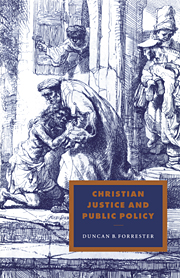Book contents
- Frontmatter
- Contents
- General editors' preface
- Preface
- Introduction
- PART I JUSTICE IN DISPUTE
- 1 Theology and public policy yesterday and today
- 2 ‘Nobody knows what justice is’: the problem of justice in a morally fragmented society
- PART II POLICIES AND PRACTICES
- PART III THEORIES AND THEOLOGIES
- PART IV THEOLOGICAL FRAGMENTS
- Select bibliography
- Subject index
- Name index
- CAMBRIDGE STUDIES IN IDEOLOGY AND RELIGION
1 - Theology and public policy yesterday and today
Published online by Cambridge University Press: 02 November 2009
- Frontmatter
- Contents
- General editors' preface
- Preface
- Introduction
- PART I JUSTICE IN DISPUTE
- 1 Theology and public policy yesterday and today
- 2 ‘Nobody knows what justice is’: the problem of justice in a morally fragmented society
- PART II POLICIES AND PRACTICES
- PART III THEORIES AND THEOLOGIES
- PART IV THEOLOGICAL FRAGMENTS
- Select bibliography
- Subject index
- Name index
- CAMBRIDGE STUDIES IN IDEOLOGY AND RELIGION
Summary
What kind of Christian voice is appropriate in the public realm in relation to debates about public policy, and how might it be most appropriately articulated today? This question has a history which presents us with warnings, constraints and possibilities, some of which are certainly relevant to the present situation. Yet in many respects it is not only theology but also political theory and public policy-making, which face an unprecedented situation in the post-modern world, where many of the signposts and guidelines of the past seem to have lost their relevance and cogency. Together they are venturing into unknown territory. Has theology anything to offer in this venture?
The place of Christian theology in the public sphere is now increasingly believed to be problematic, and there is widespread suspicion that theology can no longer claim to be dealing with public truth rather than articulating the beliefs of a minority of ‘cognitive deviants’ in the population. There has also been a widespread failure of nerve among theologians, many of whom are content to walk away from the public square and devote themselves to the minutiae of technical scholarship with little conviction that theology might have something important and distinctive to offer to public debate. Having long since, and for good reason, abandoned its claim to be ‘Queen of the Sciences’, theology is often regarded as one of the less relevant humanities, or as having forfeited any right to a place in the liberal academy.
- Type
- Chapter
- Information
- Christian Justice and Public Policy , pp. 9 - 37Publisher: Cambridge University PressPrint publication year: 1997



